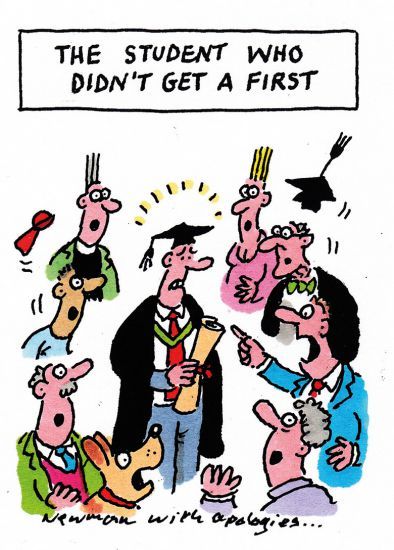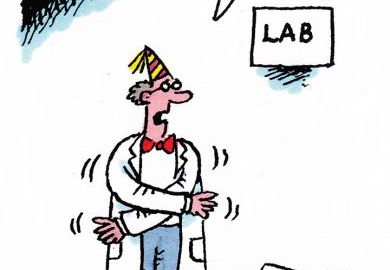
An unusual type of contraband is being illicitly circulated at a UK university, The Daily Telegraph reported on 10 January. With Queen Mary University of London’s students’ union voting to ban some tabloid newspapers last month, rebel students have taken to handing out free copies of The Sun at the institution’s Mile End campus, the paper said. “Thirteen student councillors revealed their inner tinpot totalitarian by deciding to ban the sale of newspapers on campus,” said student Emily Dinsmore, one of those handing out the Murdoch red top, who compared last month’s campus ban to a book-burning scene depicted in George Orwell’s 1984. With the Daily Mail and the Daily Express also banned by student activists, who have hit out at the “hate speech” contained in some publications, reading materials at the union shop might soon become a bit limited. Let’s hope that there are still a few copies of Times Higher Education on sale to keep those young minds engaged!
CNN may have been branded “fake news” by Donald Trump over its reporting of a former British spy’s controversial “dirty dossier” on the soon-to-be-president, but another CNN story on alleged plagiarism by a Trump aide has gained less attention. According to the news network, Monica Crowley, the president-elect’s pick for a top National Security Council role, appeared to lift large sections of her 2012 book What the (Bleep) Just Happened? from other sources. Some 50 instances of unattributed materials being used by Ms Crowley were highlighted by CNN, which then also reported a few days later that her PhD dissertation at Columbia University had also allegedly contained plagiarised material. The book by Ms Crowley, a conservative columnist and TV personality, has now been withdrawn “until such time as the author has the opportunity to source and revise the material”, according to its publisher, HarperCollins. Happily for Ms Crowley, a high-profile critic of Barack Obama, the accusations were shrugged off by the Trump administration as “a politically motivated attack”.
Gaining a first is no longer a rare distinction reserved for just a few brainboxes on campus, with almost a quarter of students now graduating with top marks, the Daily Mail reported on 13 January. According to new figures from the Higher Education Statistics Agency, some 24 per cent of graduates left university in 2015-16 with a first, up from 11 per cent in 2004-05, said the Mail, which unsurprisingly described the trend as “rampant grade inflation”. Almost three-quarters of graduates (74 per cent) gained either a first or a 2:1 last year, up from two-thirds five years ago, it added. The rise comes amid heightened concerns from employers that they now have no way of pinpointing the very brightest graduates, the newspaper said.
TV historian Tristram Hunt’s decision to quit Parliament to run the Victoria and Albert Museum prompted a tidal wave of abuse from his detractors. However, it wasn’t just Jeremy Corbyn supporters keen to take a pop at Mr Hunt, who continued to lecture at Queen Mary University of London while serving as Labour MP for Stoke-on-Trent, even crossing a picket line to teach a module on Marx in February 2014. Fellow historian Craig Murray used his blog to describe “super-posh” Hunt – son of Lord Hunt of Chesterton – as a “third-rate posh historian” and a “fourth-rate right wing politician”. Veteran Labour MP Paul Flynn also used Hunt’s resignation to take a swipe at the Blairite MP, tweeting that the learned professor was a “thinker [who had] stumbled into the vulgar alien world of politics” and “retreats back into his natural habitat of academia” having been “baffled”. The tweet was later deleted and replaced with a message, saying “Hunt contributed valued historic scholarship but new job offers more scope for talents than 3 years shouting ‘RESIGN’ at Tories”.
Whitehall’s favourite pipe dream for higher education – having more students taking an honours degree over just two years – could finally become a reality, The Daily Telegraph reported on 8 January. While governments from different parties have championed the idea over several decades, it seems that ministers are now considering plans to make “accelerated degrees” financially attractive for universities by removing tuition fee caps for these courses, the paper said. Under proposals put forward by the Competition and Markets Authority, there should be a “flexible fee cap for accelerated courses”, which would reflect the cost of offering more intensive courses over a shorter period of time, although critics warned that it could cause an “explosion of fees”. Ministers said that they were “grateful” for the CMA’s proposal and would “carefully” consider the change.
Register to continue
Why register?
- Registration is free and only takes a moment
- Once registered, you can read 3 articles a month
- Sign up for our newsletter
Subscribe
Or subscribe for unlimited access to:
- Unlimited access to news, views, insights & reviews
- Digital editions
- Digital access to THE’s university and college rankings analysis
Already registered or a current subscriber?


